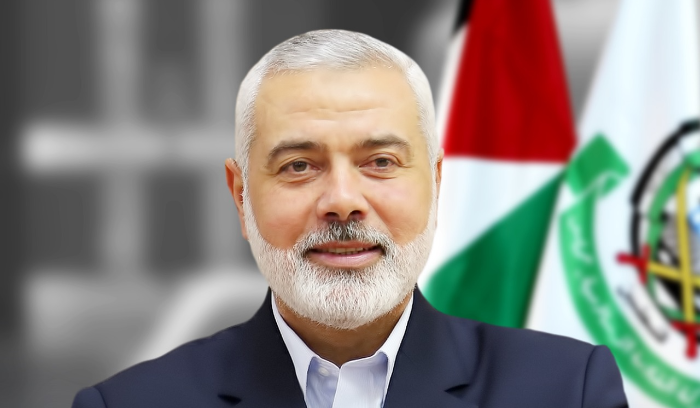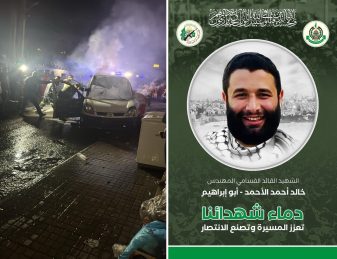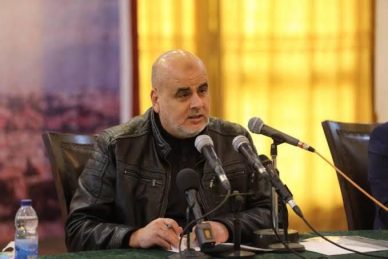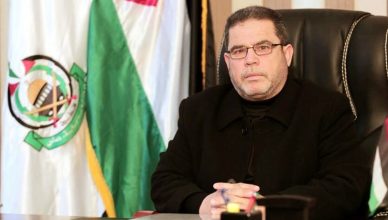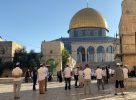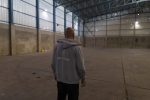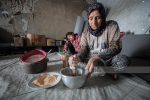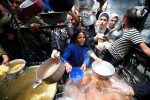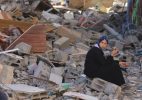GAZA, (PIC)
In a vile Zionist raid, the leader Ismail Haneyya, the head of the political bureau of the Hamas Movement, rose as a martyr on the path of the martyred leaders who preceded him on the same path, and his words “We will not recognize Israel” have remained immortal throughout history.
In his first comment on the assassination, Abdel Salam Haneyya, the eldest son of the martyr leader, said, “We have accustomed ourselves to receive the news of martyrdom, like all the sons of our people, we have accustomed ourselves to victory or martyrdom.”
He added, “We are on a march of jihad, revolution and struggle in every place and on all fronts, and if the occupation thinks that the resistance, the revolution, the struggle and Hamas will end, it is deluded, for the blood of the leadership will revive our resistance and our revolution anew.”
Haneyya had previously survived four Israeli assassination attempts, and a number of his sons, grandchildren and family were martyred, and Israeli warplanes destroyed his home several times in the wars on the Gaza Strip.
Birth and upbringing
Ismail Abdel Salam Ahmed Haneyya was born on January 29, 1963, in the Al-Shati refugee camp west of the city of Gaza, to which his family fled after being displaced by Israel in 1948 from the village of Al-Joura, the district of the city of Askalan. He got married in 1980 and has 13 children, both male and female.
Education and student activity
Haneyya studied elementary and preparatory school in the schools of the United Nations Relief and Works Agency for Palestine Refugees (UNRWA), and obtained the General Secondary Certificate from the Al-Azhar Institute, then joined the Islamic University in Gaza in 1987, from which he graduated with a bachelor’s degree in Arabic Literature. He also received an honorary doctorate from the Islamic University in 2009.
Haneyya began his activity within the Islamic Bloc representing the student wing of the Hamas Movement, and served as a member of the Islamic University Student Council between 1983 and 1984, then took over the position of President of the Student Council the following year.
Ismail Haneyya held several positions at the Islamic University in Gaza during the 1990s. In 1997, he took over the supervision of Sheikh Ahmed Yassin’s office after the Israeli occupation released him.
Arrests
The Israeli occupation forces arrested Haneyya for the first time in 1987 following the outbreak of the Palestinian Intifada, and he spent about a month in prison. He was then arrested a second time in 1988 and spent six months in prison.
The occupation forces then re-arrested Haneyya in 1989 and he spent three years in prison. After that, he was deported to Marj al-Zuhur in southern Lebanon along with 400 Hamas and Islamic Jihad leaders and members. However, he returned to the Gaza Strip after spending a year in exile, and became the head of the Islamic Bloc at the Islamic University in Gaza.
Haneyya represented Hamas in the Higher Follow-up Committee for the National and Islamic Factions during the Second Intifada, which began in 2000.
Ismail Haneyya was the target of four Israeli assassination attempts. He was injured in one of them on September 6, 2003, following an Israeli airstrike that targeted some Hamas leaders, including Sheikh Ahmed Yassin. He was also prevented from entering Gaza after returning from an international tour on October 14, 2006.
Election win and heading the government
Haneyya headed the Hamas-affiliated Change and Reform list, which won the majority of seats in the Palestinian Legislative Council in the elections held in early January 2006. He then became the prime minister of the 10th Palestinian government in February 2006. In 2007, Haneyya chaired the national unity government.
He was dismissed by Mahmoud Abbas, the president of the Palestinian Authority, after the June 2007 events, in a step described as illegal, resulting in the emergence of two governments. However, Haneyya continued to call for reconciliation and an end to the division.
Haneyya agreed several times to relinquish the premiership as part of a comprehensive reconciliation, and he actually did so on June 2, 2014, handing it over to Rami Hamdallah. Upon handing over the government, Haneyya said: “Today I willingly hand over the government, in order to ensure the success of national unity and resistance in all its forms in the coming stage.”
Haneyya held the position of deputy head of the Hamas political bureau then the leader of Hamas in the Gaza Strip.
Hamas leadership
On May 6, 2017, Haneyya became the Chairman of the Political Bureau of the Islamic Resistance Movement Hamas after he was elected by the members of the General Shura Council in elections held simultaneously in the Qatari capital Doha and in Gaza.
Haneyya is the third person to hold this position – the highest political position in Hamas – after Mousa Abu Marzook, who was elected as the first chairman of the Movement’s Political Bureau in 1992, and Khaled Mishaal, who held the position for twenty years through elections.
The leader Haneyya followed in the footsteps of the preceding leaders of the Movement, the founding leader Sheikh Ahmad Yassin, who was assassinated by the occuaption forces after leaving the mosque of the Islamic complex after performing the dawn prayer on March 22, 2004, and the leader who succeeded him, Dr. Abdel Aziz Al-Rantisi, on April 17, 2004.
His positions in the Al-Aqsa Flood
Immediately after Hamas launched the Al-Aqsa Flood operation on October 7, Haneyya appeared in a video broadcast by the media outlets, accompanied by the Movement’s leaders in his office in Doha, as he was following a report on one of the Arab channels about fighters from the Al-Qassam Brigades, the armed wing of the Hamas Movement, seizing Israeli military vehicles.
With the escalation of the Israeli war of extermination, Haneyya exerted relentless efforts to stop the massacre. He gave several speeches, held dozens of diplomatic meetings, met with many officials, and visited several countries. He refused to submit and make concessions, insisting on the rights of our people and the demand to stop the aggression, and he did not care about the Israelis’ open threats to assassinate him, nor the attempts to pressure him by killing members of his family.
On April 10, 2024, 7 members of the Hamas leader’s family were martyred, including 3 of his sons and some of his grandchildren, in an Israeli airstrike that targeted the car they were traveling in the Shati camp while they were going to congratulate the camp residents on the occasion of Eid Al-Fitr at the time.
Commenting on the news of the martyrdom of his sons and grandchildren, he said, “The blood of my children and grandchildren martyrs is not more precious than the blood of the children of the Palestinian people. I thank God for this honor that He has bestowed upon me by the martyrdom of my three sons and some of my grandchildren.”
Ten members of his family, including his sister, were killed in an Israeli airstrike that targeted their home in the Shati refugee camp west of Gaza, on June 24.
Haneyya commented on the incident, saying that the blood of his sister Um Nahid and her children and grandchildren is mixed with the blood of Palestinians in the Gaza Strip and the West Bank, and all places where the Palestinian people exist.
Positions he held
- Head of the Political Bureau of the Hamas Movement after his election in May 2017, succeeding Khaled Mishaal.
- Prime Minister of Palestine, during the period from 2006 until June 14, 2007, then continued as Prime Minister of the caretaker government in the Gaza Strip until June 1, 2014.
- Head of the Hamas Political Bureau in the Gaza Strip.
- Director of the office of Sheikh Ahmed Yassin.
- Member of the Supreme Administrative Board of the Islamic Association.
- President of the Islamic Association club in Gaza for about ten years.
- Secretary-General of the Board of Trustees of the Islamic University in Gaza.
- Director of Administrative Affairs at the Islamic University.
- Director of Academic Affairs at the Islamic University.
- Member of the Board of Trustees of the Islamic University.
- Member of the Supreme Dialogue Committee of the Movement with the Palestinian factions and the Palestinian Authority.
- Member of the Supreme Follow-up Committee for the Intifada, representing the Hamas Movement.
Some of his most famous quotes
“We will not recognize, we will not recognize, we will not recognize Israel.”
“The fortresses will not fall, the strongholds will not be breached.”
“The Movement that offers its leaders and founders as martyrs for the dignity of our people and our nation will never be defeated, and such assassinations only make it stronger, more resilient, and more determined, this is the history of the resistance and the Movement after the assassination of its leaders, it becomes stronger and more determined.”
“I, as Prime Minister, am honored to belong to the Islamic Resistance Movement, Hamas.”
“As Prime Minister, I am honored to live in the Shati refugee camp.”
“We are a people who cherish death as much as our enemies cherish life. We cherish martyrdom on what the leaders died for.”
“No, a thousand times no… Death rather than humiliation… Death rather than bargaining over the freedom of these heroes (meaning the Palestinian prisoners).”

